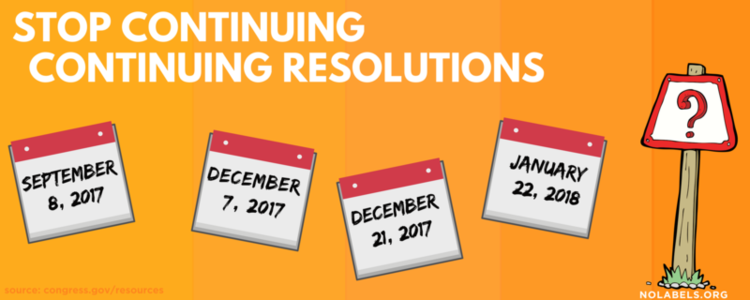Stop Continuing Continuing Resolutions
This week, the House of Representatives will vote to keep the federal government funded beyond February 8; when the short-term spending bill that ended last month’s shutdown expires. Lawmakers will likely pass another short-term spending bill — the fifth since September 30 — to keep the government functioning. But there is a renewed sense of urgency that a final budget, and not just another continuing resolution, is needed.
While many lawmakers have been involved in budget negotiations, a few have had an outsize influence. Here are some of the key players who have impacted this year’s ongoing legislative drama:
Sen. Mitch McConnell (R-KY)
As the leading Republican senator, Mitch McConnell is heavily involved in all budget negotiations and spending matters. Last month, McConnell worked with Senate Minority Leader Chuck Schumer to end the three-day government shutdown and keep negotiating on immigration, a sticking point between the parties. According to The Hill, McConnell promised to bring an immigration bill to the Senate floor following the new February 8 shutdown deadline if an agreement on DACA had not yet been reached.
Sen. Chuck Schumer (D-NY)
Chuck Schumer, the Senate minority leader, has helped lead the Democrats through budget negotiations over the past few months. On January 19, the day before the shutdown, Schumer went to the White House to meet with the president with the hope of reaching a compromise. At that meeting, Schumer offered to help fund a wall along the Mexican border in an attempt to prevent a government shutdown. However, no agreement was reached, the shutdown commenced, and Schumer has since rescinded this offer.
Sen. Susan Collins (R-ME)
According to news reports, Susan Collins used a “talking stick” to help facilitate dialogue during shutdown negotiations last month, when as many as 25 senators were gathered in her office. If you were holding the talking stick, you could speak, USA Today reported. Collins, along with Senator Joe Manchin (D-WV) were key in ending the 16-day government shutdown in 2013, when they led the “Common Sense Coalition.”

Sen. Joe Manchin (D-WV)
The New York Times reported that Joe Manchin was also a key figure in ending last month’s government shutdown, which he opposed from the start. Manchin worked with Collins to bring together senators from across the aisle to reach a consensus. He also spoke with President Trump during the shutdown to discuss how to reach a compromise on immigration.
Sen. Patrick Leahy (D-VT)
Patrick Leahy, who is the ranking member of the Senate Appropriations Committee, voted against reopening the government last month. The senator said the Department of Homeland Security should pay for the wall along the Mexican border with its budget.
Sen. Bob Corker (R-TN)
Bob Corker, the second-ranking Republican in the Senate, has vowed that he will not vote for a tax plan that adds “one penny” to the deficit. Last month, the Washington Post reported that Corker called proposed high military spending “grotesque.” And, because Corker is not running for re-election this year, he has more flexibility with voting than ever before.
Sen. Dick Durbin (D-Ill)
Dick Durbin, the minority whip of the Senate, has recently encouraged his colleagues in the Senate to pass a long-term budget agreement even if it doesn’t include a deal to protect DACA recipients. Now, lawmakers are attempting to separate the two issues. Yesterday, The Hill reported that Sens. John McCain (R-AZ) and Christopher Coons (D-DE) will introduce immigration legislation separate from the budget, in an attempt to reach a final budget deal.
No Labels is an organization of Democrats, Republicans, and independents working to bring American leaders together to solve problems.




